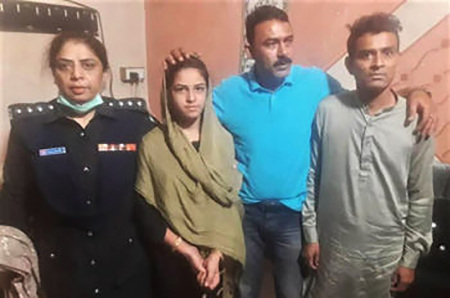Pakistan: Parents of kidnapped Christian girl denied custody; child ordered to live at shelter

Pakistan’s high court in Sindh province has freed a 13-year-old Christian girl from her abductor, a 44-year old Muslim man who forced her into an Islamic "marriage." But instead of returning the girl to her parents, she's required to remain at a government-run shelter until she turns 18.
While the court on Monday decided not to return Arzoo Raja to her family, it also did not dismiss her father's statutory rape charges brought against her kidnapper, Ali Azhar, the family's attorney told Morning Star News.
“I believe it is a good verdict, because the court has not quashed the FIR [First Information Report] registered by Arzoo’s father, and Section 375(5) for statutory rape of a minor has been added to it, a crime punishable with life imprisonment or death sentence,” attorney Jibran Nasir told Morning Star News. “Arzoo will remain in the shelter home and reconsider her [earlier] decision to not live with her parents.”
Azhar kidnapped Raja from her parents' home in the city of Karachi on Oct. 13, Raja’s father told police when he filed a report of the crime. Although she was a kidnapping victim, Raja was forced to live with Azhar for nearly a month. During that time, she signed two papers saying she had converted to Islam and married Azhar.
In late October, the Sindh High Court validated the marriage by citing Sharia law, even though Pakistan's secular law, under the Sindh Child Marriages Restraint Act, forbids child marriage.
On Nov. 2, however, after Pakistan’s minister for human rights, Shireen Mazari, said her lawyer had filed an intervention in the case, the court reversed its decision validating the illegal marriage and ordered police to arrest Azhar and take Raja to a government shelter home while investigating the case.
Raja said in a Nov. 9 court hearing that she did not want to return home and willingly converted to Islam and freely married Azhar. Her claims were almost certainly made under threat, International Christian Concern’s South Asia regional manager, Will Stark, told The Christian Post. Girls in similar cases are often tormented, threatened or tricked into signing the papers, he said.
Once kidnappers force girls to sign conversion and marriage documents, they can legally marry under Islamic law, which Pakistan recognizes as valid. Under Islamic law, a girl can be legally married immediately after her first period. Police usually ignore cases of child marriage when Islamic law becomes involved, Stark said.
“It’s possible, if not likely, there’s some undue influence on Raja,” he said. “All these cases are challenging to get to the bottom of. Getting legitimate testimony is hard.”
The court has not yet ruled on the validity of Raja’s forced conversion.
In Pakistan, religious conversion has legal implications, Stark said. The nation’s law forbids children younger than 18 from changing their religion without parental permission.
But conversion laws often prove malleable. Pakistan’s Lahore High Court ruled in 2019 that since faith is a matter of the heart, a court can’t decide if a conversion is invalid. Furthermore, after someone like Raja signs an official conversion document, public opinion in favor of Islam often keeps the courts from applying the law against underage conversions, Stark said.
Pakistani law also doesn’t allow parents to regain custody of their children who've changed their religion, even if it was coerced.
“The Christian minority is fighting for their rights against the Islamic community, which is trying to protect [Raja’s] conversion. It’s an honor-shame culture. If the court were to publicly exempt this conversion, it would bring shame to Islam. You see that with blasphemy cases as well,” Stark said. “The courts in Pakistan will work hard to avoid a sense of shame being cast on Islam.”
The government shelters have a reputation for pressuring people to embrace Islam, Stark said. Pakistan’s constitution designates Islam as the state religion, and pressure from Islamic influences there might be what keeps Raja from saying she wants to go home. In the shelter, Muslim clerics and the Muslim relatives of her kidnappers will be able to contact her.
“Arzoo is reluctant to live with her parents because of the consistent brainwashing done by the accused and certain community activists for ulterior motives,” Nasir told Morning Star News. Raja's parents’ legal counsel will be going to the Supreme Court seeking a hearing to regain custody of their daughter.
The court’s decision likely indicates that the government will not return Raja to her kidnapper at some point in the future.
Along with Azhar, all of the people who witnessed the child marriage will face charges. “From the accused to the witnesses of the marriage, the court has ordered charging them all under the law, which is a good precedent,” Nasir said.
Raja's case marks the first time Pakistani authorities have taken action against an entire group, he added.
To help support Raja, Christians can sign petitions for her release, Stark said. Pakistan’s government depends on foreign aid to function and requires Western support. When the government faces public opinion pressure from Westerners, it sometimes acts to bring justice.





















